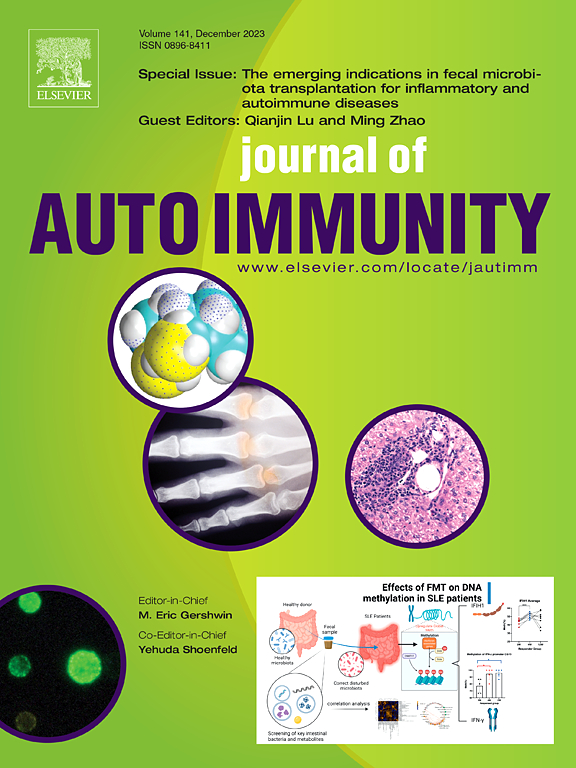The risk of cancer in pediatric-onset immune-mediated inflammatory diseases – A nationwide study
IF 7.9
1区 医学
Q1 IMMUNOLOGY
引用次数: 0
Abstract
Background and objectives
Adult-onset immune-mediated inflammatory disease (IMID) increases the risk of several cancers. However, data on pediatric-onset IMID (pIMID) remains scarce. We estimated the long-term cancer risk in pIMID and the association between medical treatment and specific cancers.
Methods
We used the nationwide Danish health registers to identify pIMID patients diagnosed from Jan 1, 1980 to Dec 31, 2018. Patients were matched with ten reference individuals based on age, sex, and residence. The primary exposure was pIMID, including autoimmune hepatitis, primary sclerosing cholangitis, Crohn's disease, ulcerative colitis, juvenile idiopathic arthritis, systemic lupus erythematosus, vasculitis, and connective tissue disease. Secondary exposures were immunomodulators and tumor necrosis factor-α antagonists (anti-TNFα). The primary outcome was cancer. Estimates are presented as hazard ratios adjusted for family income at diagnosis (AHR).
Results
We included 12,664 pIMID patients and 109,274 reference individuals. Median follow-up time was 10.6 (interquartile range: 5.4–17.7) years for patients and 10.2 (interquartile range: 5.2–17.3) years for reference individuals. Patients with pIMID had a twofold higher cancer risk (AHR 2.2 [95 % confidence interval (CI): 1.8–2.6]) compared with reference individuals. Thiopurine treatment was associated with a higher risk of lymphoma (AHR 6.1 [95%CI: 2.2–16.8]) and skin cancer (AHR 6.1 [95%CI: 2.4–15.4]). Anti-TNFα treatment was associated with a higher risk of lymphoma (AHR 4.9 [95%CI: 1.1–22.6]).
Conclusions
We found an increased cancer risk in patients with pIMID followed into adulthood. Additionally, thiopurines and anti-TNFα were associated with increased lymphoma and skin cancer risks. This highlights the importance of individualized immunotherapy and cancer surveillance.
儿科免疫介导的炎症性疾病的癌症风险 - 一项全国性研究
背景和目的成人发病的免疫介导的炎症性疾病(IMID)会增加罹患多种癌症的风险。然而,有关儿科发病型免疫介导的炎症性疾病(pIMID)的数据仍然很少。我们估算了pIMID的长期癌症风险以及医疗与特定癌症之间的关联。方法我们利用丹麦全国范围内的健康登记册,识别了1980年1月1日至2018年12月31日期间确诊的pIMID患者。根据年龄、性别和居住地,将患者与十名参照个体进行匹配。主要暴露是pIMID,包括自身免疫性肝炎、原发性硬化性胆管炎、克罗恩病、溃疡性结肠炎、幼年特发性关节炎、系统性红斑狼疮、血管炎和结缔组织病。次要接触是免疫调节剂和肿瘤坏死因子-α拮抗剂(抗肿瘤坏死因子α)。主要结果是癌症。结果我们纳入了 12,664 名 pIMID 患者和 109,274 名参照个体。患者的中位随访时间为 10.6 年(四分位数间距:5.4-17.7),参照个体的中位随访时间为 10.2 年(四分位数间距:5.2-17.3)。与参照个体相比,pIMID 患者患癌症的风险高出两倍(AHR 2.2 [95 % 置信区间 (CI):1.8-2.6])。硫嘌呤治疗与较高的淋巴瘤(AHR 6.1 [95%CI: 2.2-16.8])和皮肤癌(AHR 6.1 [95%CI: 2.4-15.4])风险相关。抗肿瘤坏死因子α治疗与较高的淋巴瘤风险相关(AHR 4.9 [95%CI:1.1-22.6])。此外,硫嘌呤类药物和抗肿瘤坏死因子α与淋巴瘤和皮肤癌风险增加有关。这凸显了个体化免疫疗法和癌症监测的重要性。
本文章由计算机程序翻译,如有差异,请以英文原文为准。
求助全文
约1分钟内获得全文
求助全文
来源期刊

Journal of autoimmunity
医学-免疫学
CiteScore
27.90
自引率
1.60%
发文量
117
审稿时长
17 days
期刊介绍:
The Journal of Autoimmunity serves as the primary publication for research on various facets of autoimmunity. These include topics such as the mechanism of self-recognition, regulation of autoimmune responses, experimental autoimmune diseases, diagnostic tests for autoantibodies, as well as the epidemiology, pathophysiology, and treatment of autoimmune diseases. While the journal covers a wide range of subjects, it emphasizes papers exploring the genetic, molecular biology, and cellular aspects of the field.
The Journal of Translational Autoimmunity, on the other hand, is a subsidiary journal of the Journal of Autoimmunity. It focuses specifically on translating scientific discoveries in autoimmunity into clinical applications and practical solutions. By highlighting research that bridges the gap between basic science and clinical practice, the Journal of Translational Autoimmunity aims to advance the understanding and treatment of autoimmune diseases.
 求助内容:
求助内容: 应助结果提醒方式:
应助结果提醒方式:


